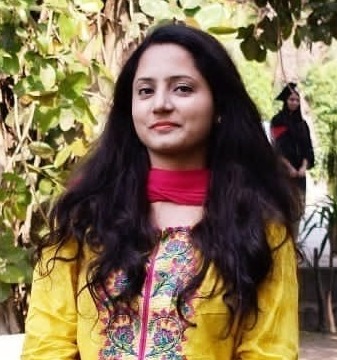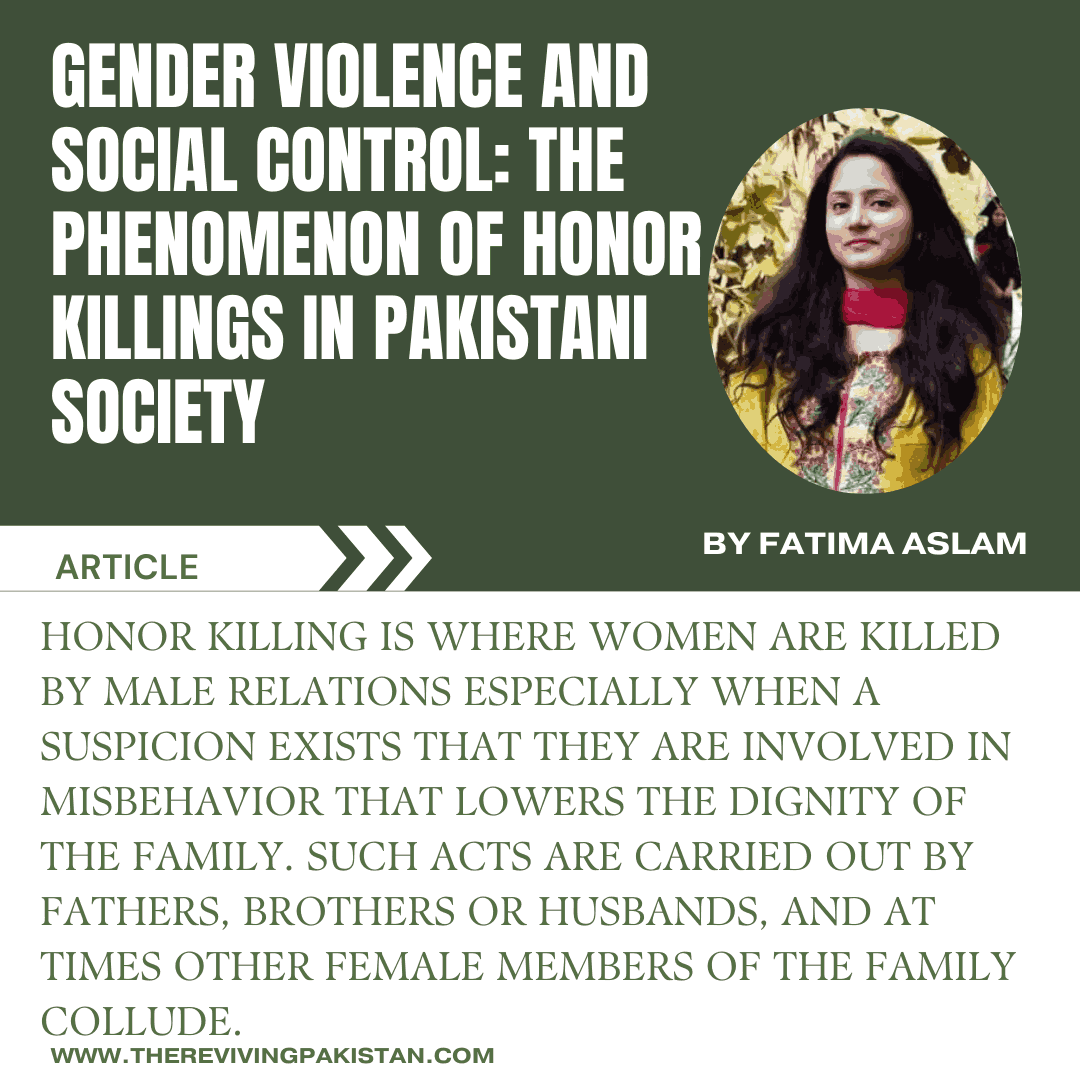About the Author(s)

Fatima Aslam
Author is a distinguished Doctor of Pharmacy, having earned her degree from Punjab University Lahore. In addition to her pharmaceutical expertise, she has successfully qualified the CSS exam, reflecting her comprehensive knowledge and commitment to public service.
Gender Violence and Social Control: The Phenomenon of Honor Killings in Pakistani Society
Honor killing is where women are killed by male relations especially when a suspicion exists that they are involved in misbehavior that lowers the dignity of the family. Such acts are carried out by fathers, brothers or husbands, and at times other female members of the family collude. Criminals are encouraged to commit heinous offences and their actions are followed by weak sentencing. This is mostly perpetrated by the young male, so that he can benefit from the non-protection of the law. In some of the societies, it is considered shameful to allow the perpetrators of honor crimes to go scot-free.
Several non-Arab Muslim societies still practice honor killings and still link it to the religion despite its wrong. But there is no such practice supported by the Quran or Hadith, and Islam has ensured women’s rights. For further clarification, there are countries such as Indonesia and Malaysia with Muslim dominated population who have never recorded any incidence of honor crimes. These acts are based on tribal norms and are related to the concepts of family lineal succession and the restriction of a woman’s ability to bear children for the preservation of the family’s honor.
In this context, the Pakistani women belonging to different categories are being harassed and killed in the name of honor because of factors like poverty, illiteracy, being belonged to tribal area, cultural brake up and remarriage, religious mindset, jirga system and what they have done wrong they have to pay by giving their lives, marriage without family consent, to payoff debts, previous enmity and at the provocation of the community. And sad part is that, Multinational human rights reporting of honor crimes is scarce, the criminals are seldom punished or are given light sentences contributing to the continuation of the crime.
There are many factors that contribute to this crime and Of course social factors such as culture and pressure put forth by society are some of the causes of honor killings in Pakistan. The traditions related to honor killings that are rooted in the culture are related to a woman who is attacked as a means to regain putative honor for the family. The above type of violence is always precipitated by such culture, mentality and social pressure that uphold the so-called family honor instead of the liberty of an individual.
Women in countries with patriarchal cultures such as Pakistan’s may receive abuse or even be killed in the honor killings because they are considered rebellious or are not conforming to the acceptable norms of the society. Such pressure make the woman accept the community imposed roles and expectations regarding gender that amps up the possibilities of an honor killing when such expectations are not met.
Other factors that have been attributed to the existence of honor killings in Pakistan include; gender inequality that augments the number of honor killings in the country. The reason that is used to explain honor killings is based on highly ingrained culture that supports the domination of women by men. These relationships of culture, social and economical structure aggravate women’s position and limit their independence and free will, resulting in a culture of violence and oppression.
In efforts to counter honor killings the legal system has tried to address it by beginning to acknowledge it as a crime in 2005, however, the problems still lie in the implementation of law and punishment of the offenders. It is evident that the practice of honor killings remains rampant in the country; the perpetrators of such acts remain Scott free, therefore proving that the problem in question is deeply rooted in the Pakistan society and there is an urgent need for legal as well as social reform to try and do away with the hành violence against women in the society.
Over the past few years, Pakistan experienced many unfortunate acts of honor killings, which are justified by the culture and tribes.
For instance, several shocking cases have been recorded in the year 2024, and this is a clear indication that the fight against this type of GBV is far from over.
The case reported on June 9, 2024, in Mardan, Khyber Pakhtunkhwah where a school teacher aged 22 years was killed by her own relatives over the issue of court marriage. Regarding women’s rights this case shows the general high price that has to be paid for disobeying the social standards.
On 21st June 2024, one more such unfortunate incident occurred in Balochistan’s Bolan district where a 13-year-old girl was killed by her father and some other individuals in a sorted in honor killing.
In the same month, a man in Pakpattan, Punjab, killed his wife by slitting her throat in a barbarous honor killing, further a son in Kabirwala, Punjab, shot his mother and three sisters.
All these incidents are something that analysts have noted in the course of the years. Facts from the Human Rights Commission of Pakistan states that until February, 2022, the number of honor killings’ overall reports was 1,961, and the number of victims was 2,537 including men, women and children. The occurrences were highest in Punjabi and Sindi areas with moderate cases in Khyber Pakhtunkhwah and Balochistan.
Another shameful incident was reported in Karachi; a highly educated man, killed his daughter and her friend in the name of honor. The prevention of honor killings have been address by the government in passing laws against it, though the implementation of the laws remains a major issue. Some sort of traditions like the cultural and tribal ones always jeopardize legal actions, and local jirgas (tribal councils) may even exacerbate legal situations by providing women the status of a Kari (an adulterous woman).
Measures aimed at combating honor killings should involve further legislation improvement, strengthening of laws’ observance, and enhancement of people’s perception change. Religious scholars from Pakistan have opposed the honor killings insisting that such actions are prohibited in Islamic law and practices are unlawful (haram).
At present, Pakistan has two type of justice systems, the informal justice systems include jirga and village councils while, the honour Killing cases are dealt under the formal legal system; customary, English and Islamic laws. This informal system was deemed an illegal entity in 2006, but was practically legalized in 2017; this makes the fight against honor crimes more difficult. Measures that attempted to prevent honor crimes were laws amending in 2004 and specifically 2016. The 2004 amendment was concerned with defining honor crimes and their punishment by raising the law’s severity of the punishment to be served by the offenders; nevertheless, it was ridden with clause that favour lenient treatment of the offenders. The act was amended in 2016 to impose life imprisonment for honor killing but there are still problems in differentiating honor killings from other forms of homicides and involvement of the family in such crimes.
Pakistan has to enforce the law and protect women from honor killings – such acts are not justified in religion or Pakistani law. Therefore, profound cultural and legislative changes are needed to fight gender discrimination and the continuation of honor crimes. Strong and sustained actions are still required to attend the causes and to look for justice for these women.
Therefore, to abstain from honor killings in the territory of Pakistan it is necessary to employ different methods aimed at the causes, legal flaws, public attitudes, and officials.
Here are several strategies that could be implemented,Mainly:
Legal Reforms Amendment of Laws: To eliminate the heinous crime of honor killings, enhance the existing laws to prevent the criminals from repeating the crime due to lack of strong legal ground. This also narrows down forgiveness process that is normally carried out by the relatives of the offender in a way that the offender would be exempted from the wrath of the law.
Specialized Courts: Set up specific courts that should independently try honor killings cases in a very efficient and non-bias.
Enforcement: Toughen the other laws that have a provision for the honor killing and make sure that whoever is involved in the crime is taken to court and punished.
Education and Public Awareness Campaigns: Air television and newspaper advertisements to sensitize the communities across the country on the vices of honor killings stating that such acts are immoral and unlawful.
School Curriculum: Teach school learners gender equality, human rights, and implications of honor killings so that respect for the female kind is instilled from childhood.
Community Programs: Promote travelers, workshops, and discussions about the adverse effects of honor killings involving religious leaders, influential persons, and the people of the community.
Empowerment of Women via Economic Stability: Vocational training for women, micro credit schemes, and job creation for women are some of the ways of empowering women economically. Education Access: Educate the girl child and the woman so that they can be in a position to change these oppressive norms.

